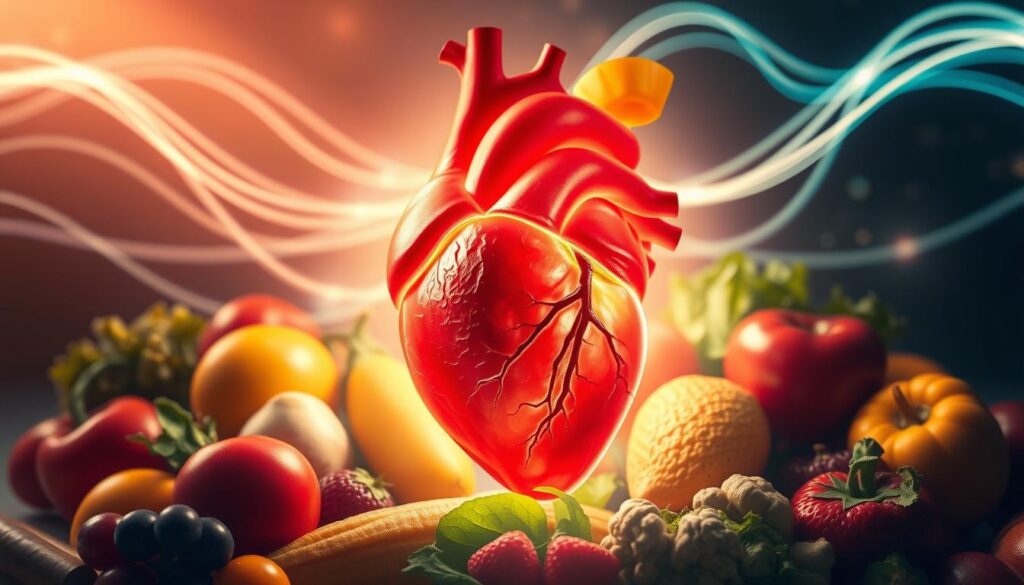24-hour fasting has become popular for its health benefits. But what does it do to our bodies? And what advantages can we get from it? Let’s explore the fascinating world of 24-hour fasting together.
Key Takeaways
- 24-hour fasting can provide various health benefits, including weight loss, blood sugar control, and protection against conditions like cancer and neurodegenerative disorders.
- The body transitions from using glucose as its primary energy source to utilizing fat during a 24-hour fast.
- Intermittent fasting, including 24-hour fasts, may help reduce the risk of type 2 diabetes and metabolic syndrome.
- Fasting can also lower inflammation levels, improve heart health, and boost brain function.
- Maintaining proper hydration and safely breaking the fast is crucial for a successful 24-hour fasting experience.
So, what exactly happens to our bodies during a 24-hour fast? And how can this practice improve our health and well-being? Let’s dive deeper into this interesting topic.
What Happens to Your Body During a 24 Hour Fast
When you fast for 24 hours, your body changes to keep energy levels stable. First, it uses stored glycogen for glucose. But after 18-24 hours, glycogen runs out, and your body enters gluconeogenesis.
Transition to Fasting Mode
In gluconeogenesis, your body makes glucose from fat and protein. This is when your body starts using fat for energy, entering fasting mode. As fasting goes on, you might enter ketosis, breaking down fat for fuel.
Gluconeogenesis and Fat Burning
When glycogen runs out, your liver starts making glucose from other sources. This keeps your blood sugar stable and gives energy to your brain and other tissues. At the same time, your body burns more fat, or lipolysis, to meet energy needs. This change lets your body use fat as its main fuel during fasting.

Fasting for a certain number of hours each day or eating just one meal a couple of days a week may have health benefits.
| Metabolic Process | Description |
|---|---|
| Gluconeogenesis | The liver produces glucose from non-carbohydrate sources, such as amino acids and fatty acids, to maintain blood sugar levels during fasting. |
| Lipolysis | The breakdown of fat stored in the body to use as a fuel source during fasting. |
| Ketosis | A metabolic state where the body uses fat as the primary fuel source, producing ketones in the process. |
Weight Loss and Fasting
Fasting for 24 hours can help with weight loss. Not eating for a day leads to a big calorie deficit. This can cause fat loss over time. Studies show that fasting might be better for losing weight than just eating less all the time. It can also make your metabolic rate go up and help burn more fat.
Calorie Restriction and Weight Loss
24-hour fasting works by cutting down on calories. Not eating for a day means you eat fewer calories. This leads to a calorie deficit, which can cause fat loss. The 5:2 diet, a type of intermittent fasting, has been shown to help with weight loss by reducing calorie intake.
But, it’s key to remember that fasting for weight loss is still being studied. It’s important to eat well and stay healthy on non fasting days. Always talk to a doctor before starting any fasting plan, especially if you have health issues.

Preliminary research suggests that fasting may be more effective for weight loss compared to continuous calorie restriction, as it can help boost metabolic rate and increase fat burning.
Benefits of 24 Hour Fasting
Fasting for 24 hours can improve your health in many ways. It helps control blood sugar and lowers body inflammation.
Improved Blood Sugar Control
Research shows that fasting can make your body more sensitive to insulin. This is good for controlling blood sugar. It’s especially helpful for those at risk of type 2 diabetes.
Fasting also improves how your body uses glucose. This is great for your metabolic health.
Reduced Inflammation
Fasting for 24 hours can also lower body inflammation. Studies found that fasting reduces C-reactive protein, a sign of inflammation. Lowering inflammation is key to preventing chronic diseases like heart disease and cancer.

Fasting has the potential to improve various aspects of health, including blood sugar regulation and reduced inflammation which are important for preventing chronic diseases.
Does fasting for 24 hours have health benefits?
Fasting for 24 hours can bring many health benefits not just weight loss. It can improve heart health and brain function. This makes it a popular choice for those looking to boost their health.
Enhanced Heart Health
Studies show that alternate-day fasting is good for the heart. It lowers total cholesterol, LDL bad cholesterol, and triglycerides. These are all factors that can harm the heart.
It also helps lower blood pressure. This is great for cardiovascular health. Fasting for 24 hours may help prevent heart disease and other heart problems.
Boosted Brain Function
Research on fasting and brain health in humans is still new. But animal studies are promising. They show fasting can protect the brain and improve cognitive function.
It may also reduce neurodegeneration and inflammation in the brain. Some studies suggest it could fight diseases like Alzheimer’s and Parkinson’s. But, we need more human studies to confirm these benefits.

Fasting supports weight loss, improves metabolic health, stimulates autophagy, and lowers inflammation which helps keep the heart and blood vessels healthy and significantly lowers the risk of cardiovascular diseases.
Fasting and Metabolism
Fasting for 24 hours does not slow down the body’s metabolic rate as many think. Research shows that fasting for less than 72 hours doesn’t change the basal metabolic rate. This rate is how many calories the body burns when it’s not active.
The body’s metabolism mainly depends on weight and muscle, not how long you fast. If you fast for only 24 hours, your metabolic rate likely won’t be hurt.
Fasting can actually help increase energy expenditure. When fasting for 24 hours, the body starts using fat instead of sugar for energy. This is called ketosis. It can make your body burn more fat, helping with weight loss and better body shape.
Fasting for 24 hours has been shown to increase fat oxidation and energy expenditure, without adversely affecting the body’s basal metabolic rate.
But, fasting for more than 72 hours can lower metabolic rate temporarily. This is a natural way for the body to save energy. It helps prevent losing too much muscle and ensures survival when food is scarce.

The impact of fasting on metabolism varies based on how long you fast and your individual health. Short-term fasting can be good, but always talk to a doctor first. This is especially true for people with health issues or those on certain medications.
Maintaining Muscle During Fasting
Fasting can make you worry about losing muscle. But studies show that fasting for 24 hours mainly uses fat for energy. It doesn’t break down muscle as much.
Resistance Training and Muscle Preservation
To keep muscle while fasting, keep up with resistance training like weightlifting. These exercises tell your body to keep the muscle, even without food. By fasting for 24 hours and lifting weights, you can keep your muscle and enjoy fasting’s benefits.
People stick to fasting diets 80% to 87% of the time. But calorie restriction diets only get 53% to 70% adherence. A study found that calorie restriction led to more muscle loss than fasting for 16 hours a day.
Research shows that men and women who fasted for 8 weeks and lifted weights did just as well as those who didn’t fast. Also, diets rich in protein help keep more muscle during weight loss. This is because they have about 1 gram of protein per pound of body weight each day.
To build or keep muscle while fasting, aim for 1 gram of protein per pound of body weight daily. With these tips, you can keep your muscle while fasting for 24 hours.
Longevity and Fasting
Research is showing that fasting might be key to living longer and aging slower. Studies on animals have found that fasting can boost good bacteria in the gut microbiome. This is linked to longer lives. Fasting also helps make more sirtuins, proteins that help control metabolism and are connected to longevity.
While we’re still learning about fasting’s effects on humans, animal studies are promising. They suggest fasting could help fight diseases like diabetes, cancer, and heart disease. A 15% calorie cut in humans might lower these risks.
Animal studies also show that eating less, by 20-40%, can make them live longer and healthier. Eating less protein, but not fewer calories, has also helped mice live longer. This is true for young and middle-aged mice.
There are different fasting methods, like Alternate-Day Fasting and 5:2 Fasting. These have been linked to better health and longer life. Even longer fasts, like 21 days, followed by eating as much as you want, have shown benefits.
More research is needed to fully understand fasting’s effects on humans. But, the early signs are encouraging. It might help us live longer and healthier lives.
By reducing calorie intake by 20–40% below the standard, CR extends lifespan and healthspan in yeast, invertebrates, rodents, and non-human primates.
Cancer Prevention and Chemotherapy
Research shows fasting might help prevent and treat cancer. Studies in animals and lab tests suggest it can slow tumor growth and make chemotherapy work better. It may do this by reducing inflammation, boosting the immune system, and targeting cancer cells.
In 2020, cancer hit 19.3 million people worldwide, causing almost 10 million deaths. Treatments like surgery, radiation, and chemotherapy are common. But, these treatments can have side effects and may not always stop cancer from coming back.
But, we need more studies on fasting in human cancer patients. It’s crucial to talk to a doctor before trying fasting. This is because fasting can lead to malnutrition and other problems in cancer patients.
Still, early research hints that fasting could help fight cancer. It might make cancer drugs work better and improve life quality for patients. For instance, fasting can help patients handle chemotherapy better and reduce side effects by lowering IGF1 levels.
| Potential Benefits of Fasting for Cancer | Proposed Mechanisms |
|---|---|
| Slowing down tumor growth | Reducing inflammation, enhancing immune response, selectively targeting cancer cells |
| Increasing effectiveness of chemotherapy | Promoting chemotherapy tolerance, minimizing adverse effects |
| Improving overall health and longevity | Lowering oxidative stress and inflammation, slowing aging process |
The research on fasting in human cancer patients is still growing. But, the potential benefits are exciting. By studying how fasting affects tumors and chemotherapy, we can find better ways to fight cancer.
How to Start 24 Hour Fasting
Starting 24-hour fasting can bring many health benefits, like weight loss and better metabolism. It’s important to do it carefully and choose a method that fits your life and preferences.
Water fasting is a common choice, where you only drink water for 24 hours. This helps your body use fat for energy. Intermittent fasting is also popular, where you alternate between eating and fasting, like the 16/8 method.
It’s key to drink lots of water when fasting for 24 hours. This helps your body detox. Start with shorter fasts and gradually increase the time to help your body adjust.
- Begin with a 12-hour fast and gradually increase to 24 hours.
- Do regular exercise, especially weight training, to keep muscle during fasting.
- End your fast with a meal full of nutrients to refill your energy.
Always talk to a doctor before starting any fasting plan, especially if you have health issues or a history of eating disorders. With the right guidance, 24-hour fasting can be a great way to improve your health.
Fasting is not about weight loss, it’s a lifestyle. It’s about longevity, it’s about health, it’s about optimization of your body. Dr. Jason Fung, author of The Complete Guide to Fasting
Conclusion
24-hour fasting can be good for your health, but it’s important to do it safely and for the long term. It can help control blood sugar, reduce inflammation, and even make your heart healthier. But, people with diabetes or eating disorders should talk to a doctor first.
To make fasting work for you, eat well on days you’re not fasting and exercise regularly. While fasting might raise cancer risk during the eating period, the benefits often outweigh the risks for many. This is especially true if you do it carefully.
Before starting 24-hour fasting, talk to a healthcare provider. Listen to your body and adjust as needed. With careful planning, fasting can be a healthy choice that brings benefits without too many risks.





